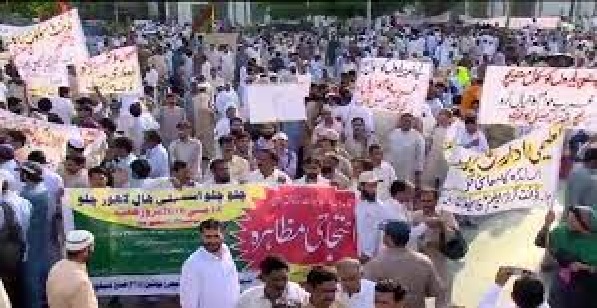Across Pakistan’s Punjab province, a wave of teacher-led protests has taken hold, in opposition to significant changes in government school norms and pension rules. Teachers protest, now in its eighth day, has garnered widespread attention as educators persist in their efforts to protect the educational system. Teachers are resolute in their commitment to an ongoing educational boycott until their demands are met, and their arrested colleagues are released.
Amidst these calls for change, the government has issued stark warnings of disciplinary action, while also taking a heavy-handed approach by arresting hundreds of protesters. Yet, these educators remain resolute, resolute in their determination to safeguard the educational future of Pakistan’s youth.
The consequences of this ongoing strike are felt far and wide, with attendance in government schools plummeting by more than 20 percent. The teachers’ demands are simple—abandon plans to outsource educational institutions and reverse the decision to hand control of 1,000 schools to external organizations. Moreover, they insist on the immediate withdrawal of changes to rules governing leave encashment, gratuity, and pensions.
These educators are not limited by provincial boundaries; their message reverberates in major cities across the region, even reaching as far as Manipur. Their commitment knows no bounds, as they advocate for the preservation of a public education system that has been the bedrock of Pakistan’s progress. The pity condition of education system in Pakistan is not hidden. In past also, there have been protests in various regions against various issues related to education. Unfortunately, Pakistan’s response to these important issues has always been repressive.
Privatisation of 1000 schools
At the heart of this controversy lies the government’s decision to entrust 1,000 government schools to the non-governmental organization ‘Muslim Hands Pakistan.’ This choice hints at a broader shift towards privatization—a move met with skepticism and concern from teachers’ unions. They argue that such a step will affect the quality of education and could deprive underprivileged students of affordable schooling. The government schools, they point out, offer free admission, whereas these privatized institutions are likely to charge fees.
In addition, the shortage of teachers in government schools is a pressing issue. Teachers argue that this problem necessitates new hiring rather than the hasty transfer of educators to different institutions, along with tempting offers of early retirement. Past experiences of privatization have been marred by inefficiencies, and private institutions struggled to manage these schools effectively.
The teachers and their supporters offer an alternative approach, suggesting that the government should consider transferring schools with inadequate infrastructure to non-governmental organizations. By doing so, these organizations can work to enhance the quality of these facilities.
As teachers from all backgrounds stand shoulder to shoulder, a question lingers—what is the government’s true intention? Some suspect it aims to undermine the government-run education system by selling off its most successful schools. As these Teachers protest continue to gather momentum, the battle for the future of education in Pakistan rages on, with teachers on the front lines, their message clear: education is a right, not a privilege.

